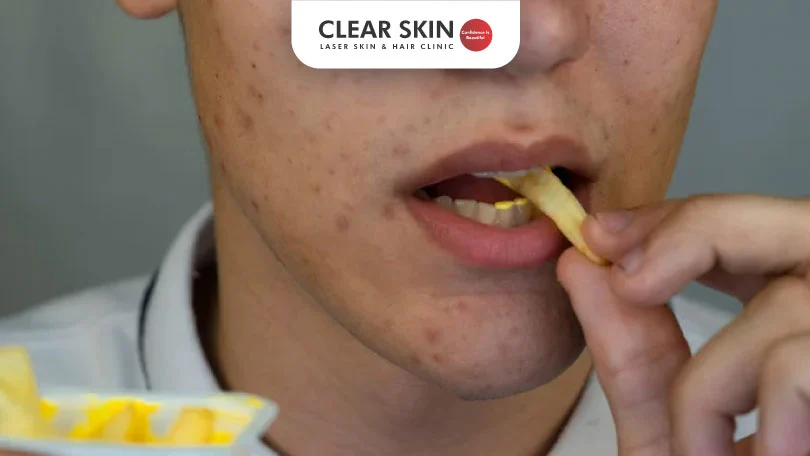The Role of Diet in Acne Management

Written by Clear Skin Content Team | Medically Reviewed by Dr. Dhanraj Chavan on August 06, 2024

Are you dealing with acne, or do you know someone who is? If you’re searching for answers, you’re in the right place. As leading dermatologists, we frequently encounter questions about acne management. This blog will delve into the specifics of acne, its triggers, and the role of diet in managing this skin condition.
Table Of Content
- What is Acne?
- How Does Diet Affect Acne?
- Which Foods Should You Avoid?
- Which Foods Help Maintain Clear Skin?
- Why is Hydration Important?
- How Do Lifestyle Choices Affect Acne?
- What Should You Remember About Acne Treatment?
- Conclusion
What is Acne?
Acne is a common skin condition where the pores become clogged with oil, dead skin cells, and bacteria, leading to pimples or “zits.” This condition often affects teenagers but can occur at any age. Factors like hormones, genetics, and certain lifestyle choices can influence acne severity.
How Does Diet Affect Acne?
The food we consume directly impacts our skin’s health. If you’re struggling with acne and neglecting your diet, your treatment might not be as effective. Some foods can trigger acne, while others can help maintain clear skin. Understanding the link between diet and acne can significantly improve your skin health.
Which Foods Should You Avoid?
- Dairy Products
Dairy products, especially milk, can sometimes lead to acne breakouts. Milk increases insulin resistance, which can cause more acne. Consider switching to alternatives like almond milk or soy milk to reduce this risk.
- High Glycemic Index Foods
Foods with a high glycemic index, such as ice cream, chocolates, white bread, and refined flour, can cause increased hormonal sensitivity. These changes increase insulin secretion, leading to higher oil production in the skin and potentially more acne. Instead, opt for low glycemic index foods that are rich in fiber and have lower carbohydrate content.
- Processed and Fried Foods
Junk food often contains unhealthy fats that can lead to obesity and hormonal imbalances, contributing to acne. Choose healthier food options to maintain balanced hormone levels.
- Sugary Drinks and Sweets
Sugary drinks and sweets can cause hormonal fluctuations and digestive problems, which can aggravate acne. Reducing the intake of these items can help in managing acne better.
- Artificial Ingredients and Preservatives
Foods containing artificial ingredients and preservatives can hinder your natural digestive system and increase acne. Stick to natural, whole foods to avoid these issues.
Which Foods Help Maintain Clear Skin?
Omega-3 Fatty Acid-Rich Foods
Foods rich in omega-3 fatty acids, such as flaxseeds and sesame seeds, play a crucial role in improving skin barrier function. These fatty acids enhance the skin’s healing power, helping to keep it glowing and reducing inflammation. Omega-3 fatty acids also support the skin’s overall health and resilience, making it more capable of handling external stressors like pollution and UV rays. Regular consumption of these foods can lead to noticeable improvements in skin texture and tone, making your skin appear more vibrant and healthy.
Vitamin B-Complex Rich Foods
Walnuts, raisins, dates, and other dry fruits are excellent sources of vitamin B-complex and zinc. These nutrients are essential for reducing inflammation and promoting healthy skin. Vitamin B-complex supports skin repair and regeneration, ensuring that your skin can heal effectively from daily wear and tear. Zinc, on the other hand, helps control oil production and can reduce the frequency of acne breakouts. Including these foods in your diet provides your skin with the necessary tools to maintain its elasticity and firmness, which are key factors in keeping your skin looking youthful and refreshed.
Green Leafy Vegetables
Green leafy vegetables, such as spinach, kale, and lettuce, are packed with essential nutrients like folic acid, vitamin E, and iron. These nutrients significantly boost the skin’s healing power, keeping it fresh and glowing. Folic acid plays a vital role in cell production and renewal, which is crucial for maintaining a healthy complexion. Vitamin E is a powerful antioxidant that protects the skin from damage caused by free radicals, while iron ensures that your skin cells receive enough oxygen to function properly. Regular consumption of green leafy vegetables can improve skin texture, reduce signs of aging, and provide a natural, healthy glow.
Vitamin C and Vitamin A Foods
Foods rich in vitamin C and vitamin A, such as lemons, amla (Indian gooseberry), and papaya, are essential for improving the skin’s barrier function and reducing dead skin formation. Vitamin C supports collagen production, which is vital for maintaining skin elasticity and reducing wrinkles. It also helps in brightening the skin and evening out the skin tone. Vitamin A, on the other hand, aids in cell turnover and repair, helping to keep the skin smooth and free from blemishes. Including these foods in your diet can result in a clearer, more radiant complexion. Lemons and amla are particularly high in antioxidants, which help fight off oxidative stress and keep the skin looking youthful. Papaya contains enzymes that gently exfoliate the skin, removing dead skin cells and revealing a fresher, more vibrant layer underneath.
Avoid Sun Exposure
Protect your skin from the sun by wearing sunscreen and avoiding direct sun exposure. Sunburned or tanned skin can increase the risk of complications.
Discontinue Certain Products
Stop using products that contain retinoids, alpha hydroxy acids (AHAs), and beta hydroxy acids (BHAs) at least one week before the peel to reduce skin sensitivity.
Consult a Dermatologist
Always consult with a dermatologist to determine the appropriate type and strength of the peel for your skin type and concerns.
Why is Hydration Important?
Proper hydration is crucial for maintaining clear skin. Drinking eight to ten glasses of water daily helps flush out toxins from the body, which can otherwise accumulate and cause skin issues like acne and dullness. Hydration keeps the skin moisturized from within, reducing the chances of dryness and flakiness. It also supports the skin’s natural barrier function, making it more resilient against external irritants. Adequate water intake ensures that your skin remains plump, reducing the appearance of fine lines and giving you a youthful glow. Moreover, well-hydrated skin is better equipped to heal from injuries and recover from environmental stress, making hydration a key factor in maintaining overall skin health.
How Do Lifestyle Choices Affect Acne?
- Stress Management
Managing stress through regular exercise and relaxation techniques can help maintain hormonal balance and reduce acne.
- Healthy Eating Habits
Avoid eating heavy meals late at night, particularly those high in non-vegetarian fats and oils. Instead, include fiber-rich vegetables in your meals to improve digestion.
- Regular Exercise
Incorporating a bit of exercise into your daily routine can help improve overall hormonal balance, leading to better skin health.
What Should You Remember About Acne Treatment?
While diet plays a significant role in managing acne, it is just one part of a comprehensive treatment plan. Medications and personalized treatment plans developed with your dermatologist are essential for effective acne management.
Every individual’s acne condition is unique, and treatment should be tailored to their specific skin type, severity, lifestyle, and environmental factors. Work with your dermatologist to create a personalized treatment plan that includes balanced diet, proper hydration, and regular exercise.
Maintaining a healthy lifestyle with a balanced diet, proper hydration, and regular exercise can improve overall skin health. If you have any questions or need a personalized plan, consult with your dermatologist to achieve the best results for your skin. Or you can reach out to our experts for more information.
Do You Know?
Roughly 250 Patients Are Treated
Everyday By These Dermatologists
(You are one click away from flawless skin)
Meet Our Dermatologist!
Conclusion
Understanding which foods to avoid and which to embrace can support your skin health. Nutrient-rich foods, hydration, and healthy habits can improve your skin’s appearance and reduce acne outbreaks. Every individual’s skin is unique, so work closely with your dermatologist for a personalized treatment plan. If you have more questions or need advice, consult with our experts.
Further Reading
How to Build an Acne Treatment Routine for Your Skin Type in Pune?
Clear Skin Clinic Pune reviews: 4.9/5 stars across 13,271+ verified reviews. Real patient experiences, treatment timelines & acne success stories.
Does Kajal Cause Dark Circles Demo
Not all dark circles come from kajal. Know the real causes, dermatologist advice, and proper makeup removal methods to protect your eyes.
HydraFacial Treatment in Pune | Cost, Benefits, Process & Results
Get instant glow with HydraFacial in Pune. Safe for sensitive skin, no downtime, visible results. Book dermatologist-supervised HydraFacial at ClearSkin.
Non-Surgical HIFU Treatment in Pune | Skin Tightening
Looking for HIFU treatment in Pune? Get safe, dermatologist-led skin lifting for face, jawline, and neck with no downtime.
Have thoughts? Please let us know
We are committed not only to treating you, but also educating you.





